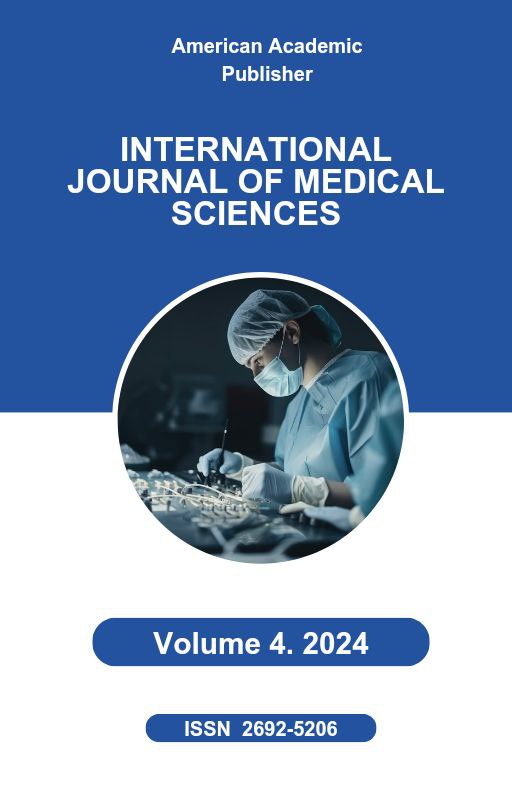 Articles
| Open Access |
https://doi.org/10.55640/
Articles
| Open Access |
https://doi.org/10.55640/
CALCIUM CHANNEL BLOCKERS AS A ETHIOLOGICAL FACTOR FOR GASTROESOPHAGEAL REFLUX DISEASE
Ismoilova M.I., Mirzajonova Sh.A. , Ferghana State Public Health Medical Institute Ferghana, Republic of UzbekistanAbstract
Gastroesophageal reflux disease is the most common visceral manifestation of chronic calcium channel blockers use, resulting in impaired esophageal clearance and retention of ingested food. Progression of gastroesophageal reflux disease and the damaging effect of due to esophageal dysmotility is clearly understood . Nifedipine is a widely prescribed calcium antagonist in a significant percentage of ischaemic heart disease patients in order to inhibit coronal vasospasm. We describe the case of severe exacerbation of gastroesophageal reflux disease in a 76-year-old female with Gastroesophageal refluxe disease who was treated with oral nifedipine for Ischaemic heart disease.
Keywords
Esophagus, Ischaemic heart disease, Nifedipine, Gastroesophageal reflux disease.
References
Jaovisidha K, Csuka ME, Almagro UA, Soegrel K: Severe gastrointestinal involvement in systemic sclerosis: report of five cases and review of the literature. Semin Arthritis Rheum 2004;34:689–702.
Abu-Shakra M, Guillemin F, Lee P: Exaggerated fibrosis in patients with systemic sclerosis (scleroderma) following radiation therapy. J Rheumatol 1993;20:1601–1603.
Ebert EC: Esophageal disease in scleroderma. J Clin Gastroenterol 2006;40:769–775.
Mouthon L, Bérezné A, Guillevin L, Valeyre D: Therapeutic options for systemic sclerosis related interstitial lung diseases. Respir Med 2010;104(suppl 1):S59–S69.
Bryan C, Knight C, Black CM, et al: Prediction of five-year survival following presentation with scleroderma: development of a simple model using three disease factors at first visit. Arthritis Rheum 1999;42:2660–2665.
Kovac J, Preiksaitis H, Sims S: Functional and molecular analysis of L-type calcium channels in human esophagus and lower esophageal sphincter smooth muscle. Am J Physiol Gastrointest Liver Physiol 2005;289:998–1006.
Ishikawa H, Iwakiri K, Sugiura T, Kobayashi M: Effect of nifedipine administration (10 mg) on esophageal acid exposure time. J Gastroenterol 2000;35:43–46.
Yoshida K, Furuta K, Adachi K, et al: Effects of anti-hypertensive drugs on esophageal body contraction. World J Gastroenterol 2010;16:987–991.
Hughes J, Lockhart J, Joyce A: Do calcium antagonists contribute to gastro-oesophageal reflux disease and concomitant noncardiac chest pain? Br J Clin Pharmacol 2007;64:83–89.
Hamada A, Isii J, Doi K, et al: Increased risk of exacerbating gastrointestinal disease among elderly patients following treatment with calcium channel blockers. J Clin Pharm Ther 2008;33:619–624.
Freindenberg F, Hanlon A, Vanar V, et al: Trends in gastroesophageal reflux disease as measured by the National Ambulatory Medical Care Survey. Dig Dis Sci 2010;55:1911–1917.
Domenighetti G, Saglini V: Short- and long-term hemodynamic effects of oral nifedipine in patients with pulmonary hypertension secondary to COPD and lung fibrosis. Deleterious effects in patients with restrictive disease. Chest 1992;102:708–714.
Prado G, Allen R, Trevisiani V, et al: Sleep disruption in systemic sclerosis (scleroderma) patients: clinical and polysomnographic findings. Sleep Med 2002;3:341–345.
Article Statistics
Downloads
Copyright License

This work is licensed under a Creative Commons Attribution 4.0 International License.

